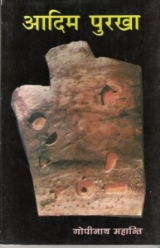
Adim Purkha
Encyclopedia
Adim Purkha is the Maithili
translation of Oriya
novel Dadi Burha, written by Gopinath Mohanty
and published by Sahitya Akademi
. The work has been translated into Maithili
by Dr. Binod Bihari Verma
.
Thenga Jani, the son of Ram Chandra Muduli, the headmen of Lulla village, is beteothed to a beautiful girl, Saria Daan, the only daughter of the same village. But he comes under the spell of Sanotsh Kumari, a Christian Domb girl. Thenga and Santosh deeply in love and reject the discipline of the tribal society. They decide to run away to Assam to work on a tea estate; they planned to build their dream home in a town where the rule of the tribal society does not prevail.
Gopinath visualizes life tribal community against a cosmic background. The despair of Ram Muduli, the plight of Thenga mother after her only son leaves the village with the Domb girl, the declaration of the dishari that Thenga and Santosh were evil dumas, the terror caused by the tiger and the rise of a village at another site all these signify the unbroken continuity of life .
Maithili language
Maithili language is spoken in the eastern region of India and South-eastern region of Nepal. The native speakers of Maithili reside in Bihar, Jharkhand,parts of West Bengal and South-east Nepal...
translation of Oriya
Oriya language
Oriya , officially Odia from November, 2011, is an Indian language, belonging to the Indo-Aryan branch of the Indo-European language family. It is mainly spoken in the Indian states of Orissa and West Bengal...
novel Dadi Burha, written by Gopinath Mohanty
Gopinath Mohanty
Gopinath Mohanty ,winner of the prestigious jnanpith award, eminent Oriya novelist of the mid-twentieth century is arguably the greatest Oriya writer after Fakir Mohan Senapati .-Early life and education:...
and published by Sahitya Akademi
Sahitya Akademi
The Sahitya Akademi ', India's National Academy of Letters, is an organisation dedicated to the promotion of literature in the languages of India...
. The work has been translated into Maithili
Maithili language
Maithili language is spoken in the eastern region of India and South-eastern region of Nepal. The native speakers of Maithili reside in Bihar, Jharkhand,parts of West Bengal and South-east Nepal...
by Dr. Binod Bihari Verma
Binod Bihari Verma
Binod Bihari Verma was a Maithili littérateur by soul, medical doctor by profession and a defence officer by career. He is most noted for his pioneering work on Panjis, which are ancient genealogical charts, Maithili Karna Kayasthak Panjik Sarvekshan. He is also known for his depiction of rural...
.
Theme of the novel Dadi Budha
Dadi Budha (1944) is one of the shorter novels of Gopinath Mohanty. It has the distinction of being his first novel based on tribal life. The novels tells the moving story of the disintegration of a tribal community under the impact of modern civilization. Dadi Budha is an ancient datepalm tree representing the eternal ancestor; it stands for the cultural heritage of the tribal people manifest in their rituals and costumes. The tree stands as a silent witness to the joys and sorrows of the tribal folk; it dominated the drama of their existence. Close to Dadi Budha stands a termite mound called Hunka Budha, yet another symbol of the primitive and innocent faith of tribal people.Thenga Jani, the son of Ram Chandra Muduli, the headmen of Lulla village, is beteothed to a beautiful girl, Saria Daan, the only daughter of the same village. But he comes under the spell of Sanotsh Kumari, a Christian Domb girl. Thenga and Santosh deeply in love and reject the discipline of the tribal society. They decide to run away to Assam to work on a tea estate; they planned to build their dream home in a town where the rule of the tribal society does not prevail.
Gopinath visualizes life tribal community against a cosmic background. The despair of Ram Muduli, the plight of Thenga mother after her only son leaves the village with the Domb girl, the declaration of the dishari that Thenga and Santosh were evil dumas, the terror caused by the tiger and the rise of a village at another site all these signify the unbroken continuity of life .

